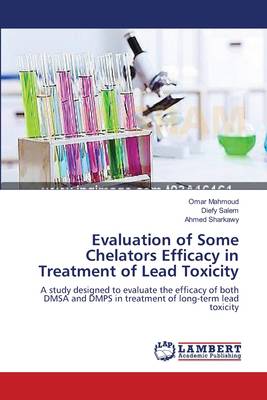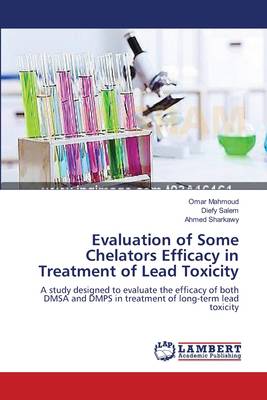
- Afhalen na 1 uur in een winkel met voorraad
- Gratis thuislevering in België vanaf € 30
- Ruim aanbod met 7 miljoen producten
- Afhalen na 1 uur in een winkel met voorraad
- Gratis thuislevering in België vanaf € 30
- Ruim aanbod met 7 miljoen producten
Zoeken
Evaluation of Some Chelators Efficacy in Treatment of Lead Toxicity
A study designed to evaluate the efficacy of both DMSA and DMPS in treatment of long-term lead toxicity
Omar Mahmoud, Diefy Salem, Ahmed Sharkawy
Paperback | Engels
€ 54,45
+ 108 punten
Omschrijving
In a search for better antidotes of metallic pollutants, many chemical (drugs) were evaluated. The aim of the present study was the evaluation and comparison the efficacy of two familiar antidotes DMSA and DMPS used for treatment of lead toxicity. The current study was designed to evaluate the efficacy of both DMSA and DMPS in treatment of long-term lead toxicity through assessment of hematological, biochemical, histopathological and levels of lead in some tissues (liver, kidney and brain) of exposed rats. One hundred twenty male albino rats were divided into four groups (30 each). The first group (C) was used as control, the 2nd, 3rd and 4th (L, D and P) were exposed to lead acetate in drinking water (100 ppm) for 12 weeks. Both D and P groups were treated with DMSA and DMPS respectively after 2, 4, 6, 8, 10, 12 weeks 24 hours prior to sampling. The investigated parameters were hematological picture, biochemical parameters (total protein, ALT, AST, γ-GT, LPO, NO and SOD), lead levels (liver, kidney and brain) and histopathological examination.
Specificaties
Betrokkenen
- Auteur(s):
- Uitgeverij:
Inhoud
- Aantal bladzijden:
- 128
- Taal:
- Engels
Eigenschappen
- Productcode (EAN):
- 9783659536601
- Verschijningsdatum:
- 13/05/2014
- Uitvoering:
- Paperback
- Formaat:
- Trade paperback (VS)
- Afmetingen:
- 152 mm x 229 mm
- Gewicht:
- 199 g

Alleen bij Standaard Boekhandel
+ 108 punten op je klantenkaart van Standaard Boekhandel
Beoordelingen
We publiceren alleen reviews die voldoen aan de voorwaarden voor reviews. Bekijk onze voorwaarden voor reviews.











